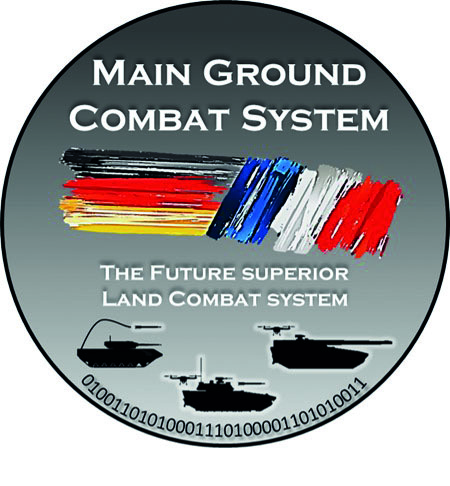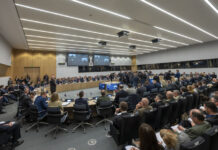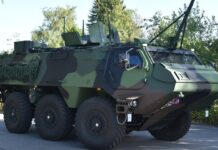In the Letter of Intent signed by Germany and France in June 2018, Germany was designated as the lead nation for the Main Ground Combat System (MGCS) cooperation project. This project’s objective is to replace the LEOPARD 2 and LECLERC Main Battle Tanks currently in service, in the mid-2030s.
Using innovative cutting-edge technologies, the aim is to provide a state-of-the-art solution that will guarantee the assertiveness and superiority of duel-capable land combat systems in any direct engagement with all potential adversaries and in the most demanding operational environments well into the second half of this century.
Projects based on international cooperation agreements are usually characterised by special, unique framework conditions. The corresponding need for coordination with multinational partners as well as the processes of international procurement organisations must be adequately taken into account through the choice of an individual project essay and appropriate procedural provisions. The individual procedural provisions for the project were approved at State Secretary level in August 2019.
Framework Conditions
and Commissioning
The MGCS project was approved in May 2017 as a top-down measure planning portfolio for the development of technology and system demonstrators. It is currently in the Part 1 analysis phase and was determined to be a Category A project in February 2019. Tasks that – according to the procedural regulation for the identification and coverage of requirements in the Bundeswehr – are part of the responsibility of an Integrated Project Team in the Bundeswehr Planning Office will be carried out by the German part of the bi-national MGCS Combined Project Team (CPT), according to the MGCS Framework Agreement and the Implementation Agreement 1 (both of April 2020) governing the individualised procedural regulations.
This joint Franco-German project team, which is responsible for the management of the project on the official side, has been set up at the Federal Office of Bundeswehr Equipment, Information Technology and In-Service Support (German abbreviation: BAAINBw) in Koblenz. There are currently 18 German and ten French posts, as a result of the German lead role, and it started work on 1 September 2020.
As a first step, the MGCS CPT is to take over the task of preparing the Common Operational Requirements Document (CORD, in English with German cover sheet), in the function of the national document “Capability Gap and Functional Requirement” and thus ensure the seamless transition of the project in the analysis phase from Part 1 to Part 2. In addition, the preparation of national German and French documents is to be supported on the way to CORD, which is scheduled for 2023. Project management for MGCS lies with the Head of Department K5.6, who – due to the German lead in the project – is also the head of the MGCS CPT.
The MGCS project, in which the tasks at hand are distributed across various working and coordination levels, has a high strategic importance in the field of duel-capable land combat systems at both national and international level. Therefore, the entire spectrum of tasks in the MGCS project is divided between the ministerial technical supervision, the management of the MGCS CPT and the project management of the national German share at BAAINBw K5.6.
The current and near-term focal points of the work are as follows:
- Supervision of the system architecture definition study, Part 1, which will run until the end of 2021, in which the system concepts that have been developed nationally in advance are to be refined by industry (a consortium formed by Rheinmetall, Krauss-Maffei Wegmann and Nexter) and integrated as a common concept, thus providing a starting point for the architecture definition.
- Development of performance specifications for contracts on the continuation of the system architecture definition study until 2025.
- Elaboration of contents and preparation of corresponding performance specifications of the bi-national research & technology efforts, which – structured in main technology demonstrators – are to make innovative technologies for the system-of-systems approach of the MGCS technologically ready for use by 2025.
- Development of content and preparation of corresponding performance specifications for the overall system demonstrator phase, planned from 2025, at the end of which decisions on the implementation of the MGCS programme are to be made in 2028.
Structure and Distribution
of Tasks
In order to perform the CPT’s tasks, three pillars are subordinate to the Programme Director (also Head of BAAINBw Department K5.6). The Programme Manager & Deputy Director (French) is responsible for the “Administration & Management” pillar. The Head of Engineering (German) leads the pillar “Technology & System Integration”. He is supported by the Deputy Head of Engineering & Coordinator System Integration (French). The Head of Operations (German) leads the Military Support Pillar. He is supported by the Deputy Head of Operations (French).
Administration &
Management
The Administration & Management pillar supports the Programme Director in his overall responsibility to ensure that the time, finance and quality frameworks of the MGCS project are met. Risk management involves coordinating all activities related to contracts, finances, legal aspects and safety standards. Possible risks are to be identified in a timely manner and appropriate countermeasures are to be planned. Project control deals with all aspects of internal procedures, processes and cost management. Control measures are to be planned in such a way that the project milestones as well as the corresponding upstream and downstream project steps are carried out in accordance with the project plan. This includes the corresponding national and bi-national reporting.
Within the framework of quality management, compliance with national and international standards and regulations is to be ensured. For this purpose, a project-specific quality management system must be developed and continuously updated. The programme planning department implements the specifications of the programme management and is responsible in particular for drawing up and implementing the MGCS project plan. In addition, corresponding documents are to be prepared and the administrative tasks associated with programme planning are to be carried out for the regular course of the programme.
Within the framework of interface management, all German and French interfaces in the MGCS project are coordinated. The focus is on processes, but content must also be considered. This includes coordination with external actors as well as the development and implementation of a project communication plan.
Technology and
Systems Integration
The Technology and Systems Integration pillar provides the Programme Director with the technological content to be contractually delivered by industry, as part of the system architecture definition study, of the research & technology structured into main technology demonstrators, and as part of the overall system demonstrator phase. The setting up and accompanying of research & technology measures is divided into the categories Command, Control, Communication, Computer and Intelligence (C4I), Mobility, Effectiveness, Survivability/Protection and Surveillance, Detection, Recognition, Identification (SDRI).
Technology management brings together the technological expertise on individual topics and accompanies the technology development through the main technology demonstrator phase. This is essentially done by defining and implementing research & technology projects. The goal is to have all the necessary, especially innovative technologies technologically ready for use, that is, with Technology Readiness Level 6 (prototype in operational environment), at the beginning of the overall system demonstrator phase.
During the overall system demonstrator phase, technology management must then ensure that the individual technologies can be fitted into the overall concept.
Military Support
The Military Support pillar is responsible for evaluating and implementing objectives and planning for the Programme Director. The aim is to establish a bi-national position in all military matters of the CPT. This is done with a focus on the areas of CORD, Concept of Operations) and Threat Analysis. To this end, the positions and specifications of the German and French armies as future users/operators of the MGCS are to be defined and taken into account.
For the CORD work area, the development of a capability situation/capability profile and continuous conceptual MGCS capability analysis are to be carried out by accompanying the capability development in the MGCS project as well as integrating the evaluation of the results of future developments in Germany, France and other partner nations within and outside the MGCS project. The development of the bi-national CORD document will be based on conceptually derived capability gaps and the formulation of functional requirements as well as requirements in the project elements.
In the CONOPS working area, bi-national documents on operational principles as well as further required conceptual basic MGCS documents are to be created. In addition, work is to be done on higher-level conceptual documents and MGCS contributions to national service regulations and other documents for command and control, deployment and training of the German and French armoured forces. This includes the development and continuous updating of operational scenarios.
A threat analysis relevant to the MGCS capability situation is to be developed and to be continuously updated by evaluating and implementing findings from Germany, France and other partner nations on potential adversaries and their equipment. In addition, evaluation and implementation of findings from German and French mission evaluation as well as from exercises, investigation, studies and comparable projects from both countries are to be taken advantage of for the programme.
Contractual Support
In the demonstrator phase, the BAAINBw also assumes the role of the contracting authority for both participating nations. In this function, the BAAINBw is the competent organisation for contract drafting and legal issues.
Summary
The structure, scope and performance of tasks of the MGCS CPT correspond to bi-nationally agreed specifications. An adaptation of the individualised procedural provisions in the course of the project – for example, due to the integration of further partner nations into the project, as an implementation of lessons learned in the project work, or as a reaction to innovative technological findings – is, however, possible at any time with the approval of the State Secretary and will then be carried out in accordance with the original provisions.
Armin Dirks













